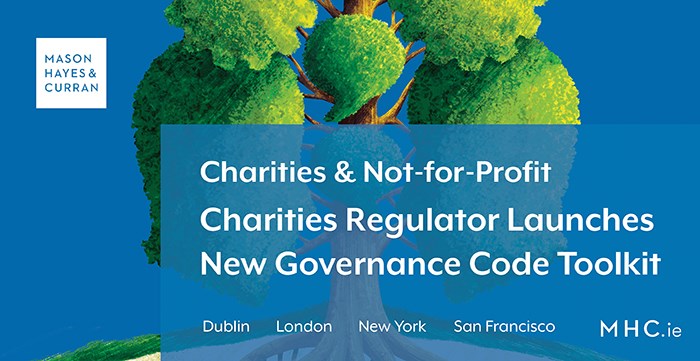
The Charities Regulator recently published a number of new guidance documents and templates designed to help charity trustees effectively implement the Charities Governance Code. If you are a charity trustee, you should review the toolkit so that you know what guidance and support is available to your charity as it commences the process of getting to grips with the Charities Governance Code.
The Charities Governance Code was published by the Charities Regulator to ensure the implementation of certain minimum standards that every charity should meet in order to effectively manage and control their organisation. 2019 is the year that all charities are expected to familiarise themselves with the Charities Governance Code. Charities will be expected to implement the Charities Governance Code from 2020 onwards and to report on their compliance from 2021.
Purpose of the toolkit
The interim Chief Executive of the Charities Regulator, Ms Helen Martin, when launching the first set of guidance materials explained that, “the purpose of the suite of materials and templates is to assist charities in meeting the minimum standards set out in the Code, thereby enabling charity trustees to effectively manage and control their organisations”.
The toolkit is available here.
What is in the toolkit?
1. Charity trustee duties and roles
The toolkit includes a useful infographic which outlines the legal duties of charity trustees. The infographic sets out a checklist to assist charity trustees to:
- Ensure that a charity is carrying out its charitable purpose for the public benefit
- Comply with the charity’s governing document
- Be accountable and compliant with the law
- Manage resources responsibly
- Act in the charity’s best interest, and
- Act with reasonable skill and care
2. Meetings and minutes
The toolkit includes practical advice and tips on minute taking at board meetings. A guidance note sets out the content that should be included in board minutes and the standard format that minutes should take. The guidance note also contains a list of common mistakes that minute takers should be aware of before entering a meeting.
The toolkit includes a guide which will be of practical benefit to chairpersons. The guide sets out the role of the chairperson in a number of areas including:
- Leading the board
- Ensuring the smooth running of meetings
- Promoting good governance
- Supervising and supporting managers and / or the CEO, and
- Acting as an effective figurehead or spokesperson
3. Planning and risk
The toolkit includes a guide on risk management for charities which outlines what a risk is, the categories of risk which may affect a charity and how to implement an effective risk management system. Accompanying this guide is a template risk register which provides a template for logging, ranking and mitigating risks that could impact your charity.
4. Recruitment and induction of charity trustees
The toolkit provides helpful advice on the recruitment and induction of prospective charity trustees. A guidance note outlines what needs to be considered when recruiting new charity trustees and how to make sure they receive a proper induction. An induction pack checklist sets out the materials that should be included in the induction pack for each charity trustee. A guidance note is also made available to assist charity trustees in developing a code of conduct for trustees.
Further documentation
The following documents will be available in the toolkit in the coming months:
- Code of conduct for volunteers template
- Code of conduct for employees template
- Charity trustee recruitment policy
- Staff recruitment policy
- Succession planning, and
- Due diligence for prospective charity trustees
How to achieve good governance for your charity
Good governance is essential for the smooth running of a charity. The Charities Governance Code and toolkit can help charities to improve governance. The requirements of each charity will be different. Our Charities & Not-for-Profit team works with various charities to ensure compliance with good governance and regularly develops bespoke compliance systems for our charity clients. These systems take full account of the requirements of the Charities Governance Code and all other applicable codes and standards, on an individual charity basis.
Good Governance Awards – a reminder
Entries for the 2019 Good Governance Awards are being accepted since 1 June 2019. The awards recognise and encourage adherence to good governance practice by non-profits in Ireland. The awards are a great way to showcase the work that your charity does to maintain good governance.
If your charity would like to be considered for a Good Governance Award, further information about the award categories and eligibility criteria is available here. Entries are also submitted through that website. The closing date for entries is 13 September 2019.
Conclusion
2019 is the “year of learning and preparation” for the Charities Governance Code. The toolkit provides guidance on a number of areas of governance, which should be reviewed and considered by all charity trustees.
Our Charities & Not-for-Profit team is busy assisting charities with preparations for the Charities Governance Code. If you would like to discuss how your charity should commence preparations, please get in touch with us.
The content of this article is provided for information purposes only and does not constitute legal or other advice.




